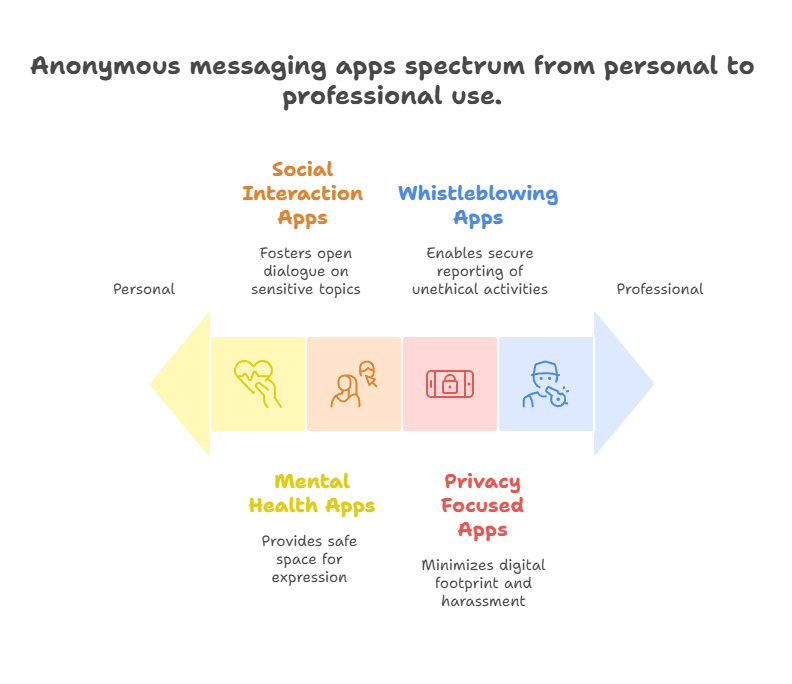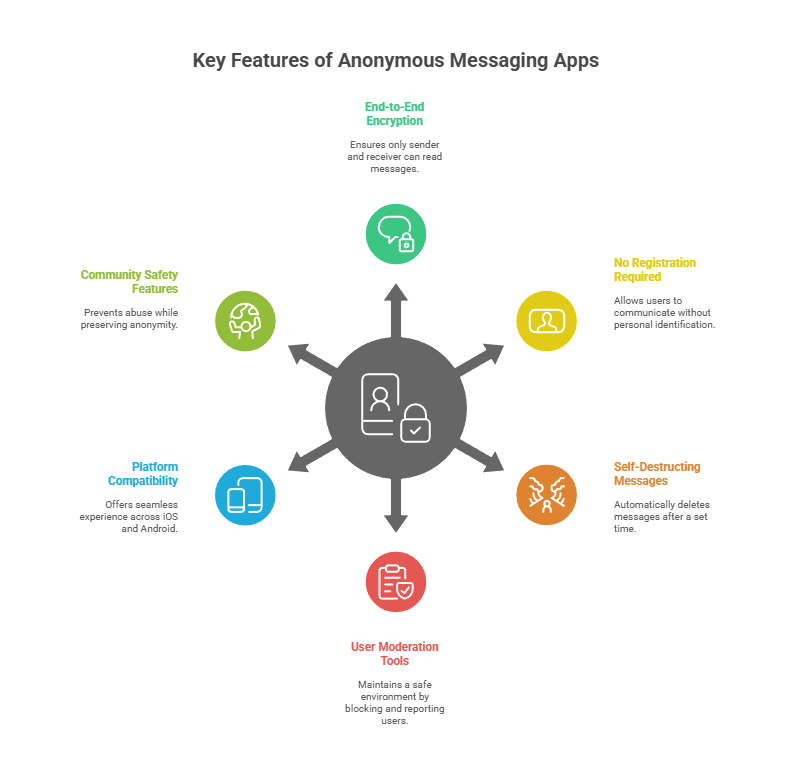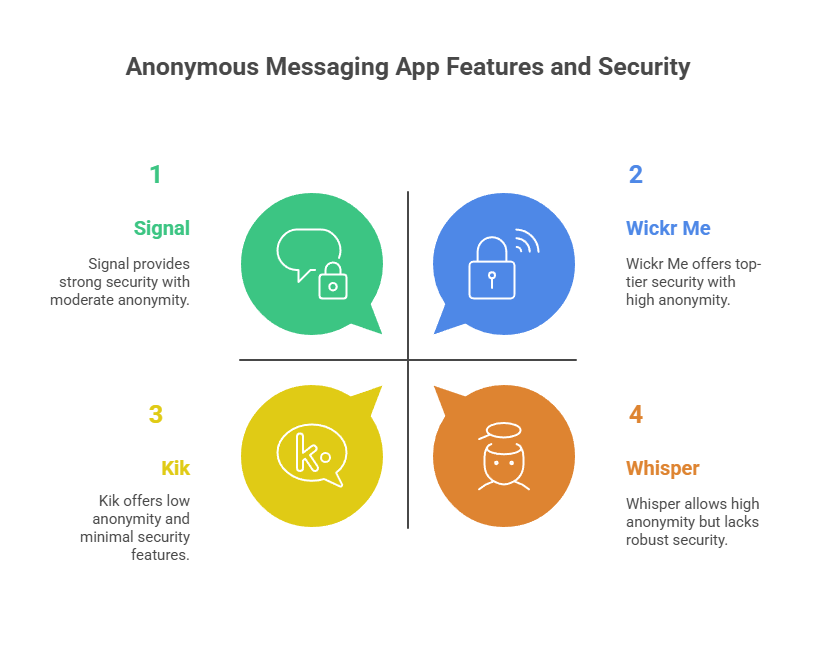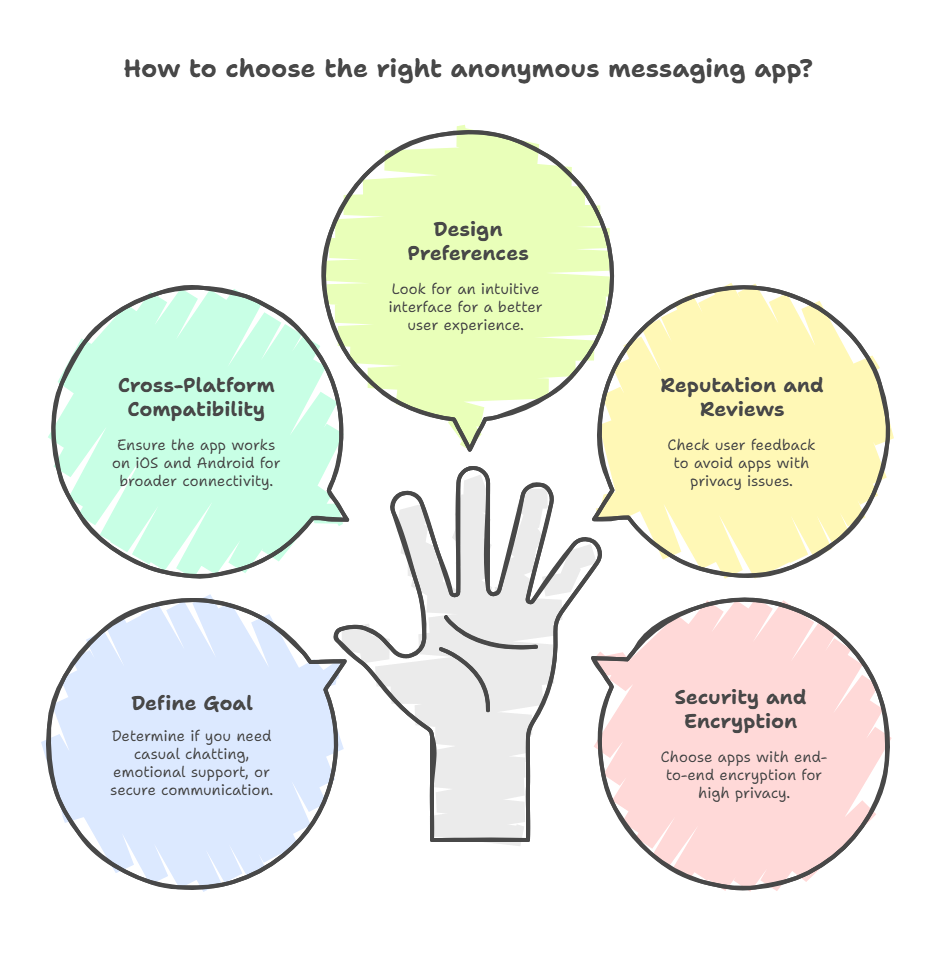
As digital communication continues to dominate both personal and professional spaces, concerns around privacy and data security are more pressing than ever. Users are becoming increasingly aware that their online interactions—whether through social media, messaging apps, or email—are often tracked, stored, and sometimes shared without explicit consent. In response, anonymous messaging apps have emerged as a powerful alternative, offering a secure environment where individuals can communicate without disclosing their identity.
Table of Content
The demand for these platforms stems from a variety of needs. For some, it’s about preserving confidentiality in sensitive conversations; for others, it’s about finding a space to express thoughts and emotions without fear of judgment. From mental health support and peer feedback to whistleblowing and private social interaction, anonymous messaging is enabling safer, more open communication for people across different walks of life.
In an age where massive data breaches, digital surveillance, and unauthorized tracking have become all too common, ensuring privacy in digital communication is not just a preference — it’s a necessity. Anonymous messaging platforms offer a practical solution for those seeking a digital safe space. However, while these tools can be liberating, they also come with a responsibility. It’s crucial to use them ethically and avoid spreading misinformation, hate, or engaging in harmful behavior under the veil of anonymity.
In this blog, we’ll explore the 12 best anonymous message apps for iOS and Android that empower users to communicate privately. Each app offers a unique set of features, user experiences, and security measures, helping you choose the one that best fits your needs.

The concept of anonymous messaging has evolved from niche forums and hidden chat rooms to sophisticated apps available right at your fingertips. These tools cater to a wide range of needs — from emotional well-being and social freedom to professional confidentiality and secure communication. So, why are people increasingly drawn to these platforms?
For many users, anonymity offers the comfort of being untraceable in their conversations. These platforms typically don’t require phone numbers, emails, or personal details to register, allowing users to communicate freely without building a digital footprint. For anyone wondering how do I anonymously text someone without revealing their identity, these apps provide a secure answer, often equipped with encryption and self-destructing messages.
Anonymous messaging can be a lifeline for individuals who feel isolated, judged, or unable to open up in traditional environments. Whether it’s sharing personal struggles or seeking support from strangers, anonymity allows users to express emotions more honestly and safely. Some anonymous message apps even cater specifically to mental health, offering a nonjudgmental space for emotional release.
In corporate, journalistic, or governmental contexts, anonymity plays a critical role in uncovering the truth. Whistleblowers often rely on secure and anonymous platforms to report unethical or illegal activities without fear of retaliation. For developers, there’s rising interest in anonymous message app development that prioritizes encryption and user safety for such high-stakes scenarios.
For those exploring sensitive topics — such as sexuality, identity, or political views — anonymous chatting removes the barriers imposed by societal norms. It fosters open dialogue and diversity of thought, especially in environments where such topics may be stigmatized.
Many users are wary of being tracked, doxxed, or targeted online. Using anonymous platforms minimizes these risks by stripping away identifying information. This has led to a surge in the demand to create an anonymous message app that puts user control and safety at its core.
Whether you’re seeking emotional support, private interactions, or simply a space to vent without consequences, anonymous messaging apps provide a secure, judgment-free environment to connect and communicate.

As the demand for private communication grows, so does the need for trustworthy and secure anonymous messaging apps. But not all apps that promise anonymity are created equal. When deciding which platform to use — or even when planning to create an anonymous message app — there are several core features that can make or break the user experience and trust. Here’s what to look for:
The foundation of secure messaging is encryption. Apps that use end-to-end encryption ensure that only the sender and receiver can read the messages. Even the app’s servers can’t access the content. This is especially important for users who value confidentiality, such as whistleblowers or those seeking help with mental health.
An essential element of true anonymity is minimal user identification. Many anonymous message apps don’t require users to register with phone numbers or emails, which helps reduce digital tracking. This makes it easy for anyone wondering, “how do I anonymously text someone?” — these apps allow it with just a username or no profile at all.
Messages that automatically delete after being read or after a certain time offer users peace of mind. Self-destructing messages are a critical feature for those who don’t want conversations to linger in the cloud or on devices, reducing the risk of exposure.
Anonymity can sometimes be misused. That’s why robust moderation tools — including blocking, reporting, and AI-driven content filtering — are essential. These features maintain a respectful and safe environment, especially in group or public chat scenarios.
The best apps offer seamless experiences across both major mobile operating systems. Whether you’re chatting on iPhone or Android, the app should provide uniform features and security protocols. This is also crucial for developers aiming to build an anonymous message app for a broader user base.
Apps that allow community-driven moderation, anonymous feedback mechanisms, and real-time content flagging help balance freedom with accountability. These features prevent abuse while keeping the essence of anonymity intact.
When evaluating or planning anonymous message app development, these features are not just nice-to-have — they’re essential to protect users, encourage genuine interactions, and maintain the integrity of private communication.
Building an anonymous messaging app in 2025 requires a strategic blend of secure technology, user-focused design, and strict privacy protocols. As digital communication continues to evolve, users increasingly seek platforms where they can express themselves without fear of judgment or data exposure. Whether you’re planning to create an anonymous message app for casual conversations, mental health support, or whistleblower communication, the following steps will guide you through the process.
Start by clearly identifying the core purpose of your anonymous message app. Is it for anonymous feedback, secret confessions, secure group messaging, or real-time chatting with strangers? Your use case will directly influence the features you prioritize, the level of anonymity you enforce, and the legal frameworks you must consider. For example, apps designed for mental health expression may require moderation tools, while whistleblower apps must offer airtight encryption and data protection.
Study popular apps like Whisper, Yik Yak, or Wickr Me to understand their strengths, weaknesses, and user engagement models. Analyze reviews, app store rankings, and user feedback to discover what users love — and what frustrates them. This research helps you identify gaps you can fill and features you must include to stay competitive.
The success of any anonymous messaging app hinges on choosing a secure and scalable tech stack. For mobile apps, you’ll typically use:
If you’re aiming to build an anonymous message app with high privacy standards, prioritize frameworks that support real-time encryption and data anonymity at the architecture level.
User experience is critical. Keep the interface intuitive, minimal, and distraction-free. Since users value privacy, allow anonymous sign-in via username or random IDs — never mandate phone numbers or emails. Include features such as:
UI/UX must ensure users feel safe, not tracked — and still engaged enough to return.
Now it’s time to build out your app’s functionality. Key features typically include:
At this stage, security should be baked into every function — not added as an afterthought.
Security is non-negotiable. If you’re serious about anonymous message app development, implement:
It’s also wise to conduct third-party penetration testing and privacy audits before launch.
Perform functional, security, and usability testing across both Android and iOS. Make sure messages encrypt and decrypt correctly, anonymity is preserved, and the UI flows are intuitive. Test edge cases like:
Beta testing with a small user group will reveal usability issues and early feedback.
Once polished, submit your app to the App Store and Google Play, ensuring all privacy policies and terms comply with platform requirements. Post-launch, monitor user behavior using analytics (anonymously, of course), track crash reports, and gather feedback to improve features.
Moderation must continue post-launch, especially in apps that allow public or group interaction. Implement AI moderation tools if needed to detect spam, threats, or abuse in real time.
Anonymous apps need ongoing support — especially as privacy standards evolve. Plan for regular updates, bug fixes, and feature rollouts. Introduce new engagement options like anonymous polls, reactions, or secure voice notes to keep users engaged.
As demand grows, you’ll need to scale backend servers and storage. Investing in cloud infrastructure that can auto-scale will help maintain performance while protecting data integrity.
If you’re planning to build an anonymous messaging app, this step-by-step guide gives you a blueprint to start strong and grow responsibly. With the right balance of privacy, usability, and innovation, your app can become a trusted platform for safe, anonymous conversations in a digitally exposed world.
The cost to build an anonymous messaging app in 2025 typically ranges from $10,000 to $100,000+, depending on factors like app complexity, feature set, platform compatibility, and overall design sophistication.
Below is a detailed cost breakdown based on different development stages and feature sets.
Estimated Cost: $30,000 – $50,000
Timeline: 2–3 months
A minimal version to test your concept in the market.
Includes:
Best For: Startups looking to launch quickly with a lean budget
Estimated Cost: $60,000 – $100,000
Timeline: 4–6 months
A more robust app built for privacy-focused users and scale.
Includes:
Best For: Mid-sized teams or funded startups prioritizing user security and UX
Estimated Cost: $100,000 – $180,000+
Timeline: 6–9+ months
Built for scale, high performance, and enterprise-level security.
Includes:
Best For: Privacy-first platforms, whistleblower tools, mental health or enterprise communication apps
| Component | Approx. Cost |
| UI/UX Design | $5,000 – $15,000 |
| Backend Architecture | $10,000 – $25,000 |
| Third-Party APIs (e.g., Firebase, Twilio) | $2,000 – $10,000 |
| Cybersecurity & Penetration Testing | $5,000 – $15,000 |
| Ongoing Maintenance | 15–20% of development cost annually |

Whisper is one of the most popular anonymous message apps, designed to let users share their thoughts, confessions, and secrets with complete anonymity. Users post short messages overlaid on images and can receive replies from others.
After its initial rise and fall, Yik Yak has returned with improved safety measures. This app allows users to post short anonymous messages visible to others within a five-mile radius.
Signal is best known for its high-security private messaging. While not a pure anonymous app, it allows for pseudonymous communication and is a strong choice for users prioritizing encryption.
Telegram offers a mix of open social communication and private, secure chat features. With the ability to use a username instead of sharing your number, it supports semi-anonymous chatting.
Minds is a decentralized, open-source social networking app that supports anonymous participation. It blends social interaction with privacy-focused tools and even includes blockchain-based rewards.
Though not a messaging app in the traditional sense, AnonAddy provides anonymous email aliases, allowing users to send and receive mail without revealing their real identity — useful in situations requiring pseudonymous correspondence.
Kik is a long-standing messaging app that allows users to communicate via usernames, making it possible to chat without revealing phone numbers or real names. While not built exclusively for anonymity, it offers a pseudo-anonymous experience.
Connected2.me is a social discovery platform that allows users to engage in real-time chats anonymously. With a profile structure similar to Instagram, users can receive anonymous messages from others or start conversations without revealing their identity.
Sarahah gained massive popularity for letting users send and receive anonymous feedback, especially among students and workplace teams. Although the original app faced scrutiny and was removed from stores, similar apps like Tellonym and Lipsi have taken its place.
Omegle is a long-running platform that connects users randomly via video or text chat, without requiring any registration. While it’s not a traditional anonymous message app, it provides complete anonymity for real-time conversations with strangers.
RandoChat is a lightweight, no-frills app that lets users send anonymous messages to random users. No registration, usernames, or personal data is needed — messages are instantly deleted after being read.
Wickr Me is designed for users who prioritize high-level privacy and secure messaging. It supports anonymous message app features like encrypted communication, no data storage, and messages that self-destruct after a set time.
While anonymous message apps offer a sanctuary for private communication, they also come with risks that can’t be ignored. The same veil of anonymity that empowers honest expression can, if misused, foster cyberbullying, harassment, or the spread of harmful content. This duality presents a delicate balance between freedom and responsibility.
Anonymity should never be a license to harm others. Some individuals exploit anonymous platforms to send abusive messages or misinformation without consequences. This behavior not only affects victims but also undermines the credibility of platforms that aim to protect privacy.
To counter misuse, most reputable apps have implemented moderation systems, including automated flagging, human review, and user-based reporting tools. Features like message filters, IP bans, content removal, and community guidelines are crucial in maintaining safe environments. For developers planning anonymous message app development, integrating real-time AI moderation is now a best practice.
If you’re asking, “how do I anonymously text someone while staying secure?“ — start by choosing apps that offer end-to-end encryption and don’t store identifiable user data. Avoid clicking suspicious links, never share personal information, and be cautious when engaging with strangers. Use apps that offer self-destructing messages or content controls.
Some anonymous apps are popular with teens, which raises concerns for parents. Not all platforms offer age verification or parental controls, making it important to monitor usage and educate young users about responsible communication. Parental monitoring apps or device settings can help ensure safer browsing experiences.
While most anonymous communication is legal, the intent behind the usage matters. Harassment, defamation, and threats — even anonymously — can lead to legal consequences. It’s important to use these platforms ethically and understand local laws regarding digital communication and data privacy.
Anonymity can be a force for good — but only when used with integrity and respect.

With dozens of options available, choosing the right anonymous message app depends on what you value most — casual chatting, serious privacy, mental wellness, or whistleblowing. Here’s how to find the right fit:
Are you looking for casual conversations, deep emotional support, or secure exchanges of sensitive information? Apps like Whisper and Yik Yak cater to social expression, while Wickr Me and Signal are better suited for high-security communication. If your goal is to build an anonymous message app, identifying your audience’s intent is the first step in the product roadmap.
Make sure the app supports both iOS and Android — especially if you use multiple devices or want to connect with a broader network. Some apps also offer web access, which is useful for flexibility.
A clean, intuitive interface can greatly enhance the user experience. Look for apps that are easy to navigate, allow fast access to privacy settings, and have clear messaging options.
Before downloading an app, check user reviews, ratings, and the platform’s reputation. Apps with a history of data leaks or privacy violations should be avoided. Trusted sources like Reddit or app review blogs can help filter out unsafe platforms.
The level of encryption varies widely. For serious privacy, opt for apps offering end-to-end encryption, no metadata logging, and message self-destruction. If you’re evaluating how to create an anonymous message app, prioritizing these features can give your product a strong competitive edge.
Making the right choice ensures a safer, smoother, and more effective anonymous communication experience.
When it comes to building secure, scalable, and intuitive anonymous messaging apps, Code Brew Labs stands out as a trusted technology partner with proven expertise. From startups looking to create anonymous message apps to enterprises seeking privacy-first communication platforms, Code Brew Labs delivers end-to-end solutions tailored to your vision — and backed by real-world technical excellence.
Anonymous messaging is not just about hiding identities — it’s about building trust through technology. At Code Brew Labs, our developers specialize in creating platforms that prioritize encryption, data minimalism, and secure communication protocols. We understand the unique challenges of building apps where anonymity must coexist with usability, moderation, and compliance — and we solve for all three with precision.
Whether you aim to build an anonymous messaging app for iOS, Android, or both, we use cutting-edge technologies like end-to-end encryption (AES-256, RSA), ephemeral data storage, real-time communication tools (like WebSockets or Firebase), and secure cloud hosting. Our engineering team ensures your app isn’t just functional — it’s fast, safe, and future-ready.
No two anonymous apps are alike. Some are built for emotional expression, others for whistleblowing, social discovery, or mental health support. We take a consultative approach — understanding your goals, audience, and risks — and build custom feature sets accordingly. Whether you want disappearing messages, no-login chat, or location-based anonymity, we deliver tailored solutions that feel seamless to users and stable to you.
With over 10+ years in the mobile app development industry and 500+ successful projects worldwide, Code Brew Labs has earned its place as a global leader in secure app development. Our portfolio includes apps used by millions, and our clients return for upgrades, maintenance, and continued innovation — a testament to our long-term partnership approach.
We follow an agile development model, giving you full visibility and flexibility throughout the process. From wireframes to post-launch support, you’re always in control. Plus, we help you scale — whether it’s expanding from MVP to full version, increasing server load, or launching new privacy features as user demand grows.
Choosing Code Brew Labs means partnering with a team that’s not only technically sharp but also deeply committed to privacy ethics, design innovation, and long-term success. If you’re ready to build a next-generation anonymous message app that users can trust, we’re ready to bring your vision to life.
The rise of anonymous message apps is more than just a trend — it’s a reflection of how people want to communicate in a digital age filled with noise, surveillance, and judgment. As privacy concerns intensify, more users are seeking platforms that allow them to speak freely without the baggage of identity. To meet this growing demand, a mobile app development company plays a critical role in designing secure, intuitive, and scalable anonymous messaging solutions that align with evolving user expectations.
Looking ahead, the future of anonymous messaging will depend heavily on moderation technology. AI-driven tools will play a central role in filtering harmful content while preserving the benefits of anonymity. This balance is key to creating spaces that are both safe and liberating.
But with the freedom of anonymity comes the challenge of regulation. Governments and tech platforms may introduce stricter policies to prevent abuse, which could shape how these apps evolve. Developers building such platforms must constantly weigh innovation against ethical responsibility.
Ultimately, anonymous messaging is here to stay — but it must be used wisely. Whether you’re chatting with strangers, seeking support, or exploring new ideas, remember that anonymity is a privilege. Use it with respect, and you’ll discover a digital space that values authenticity, privacy, and freedom.
